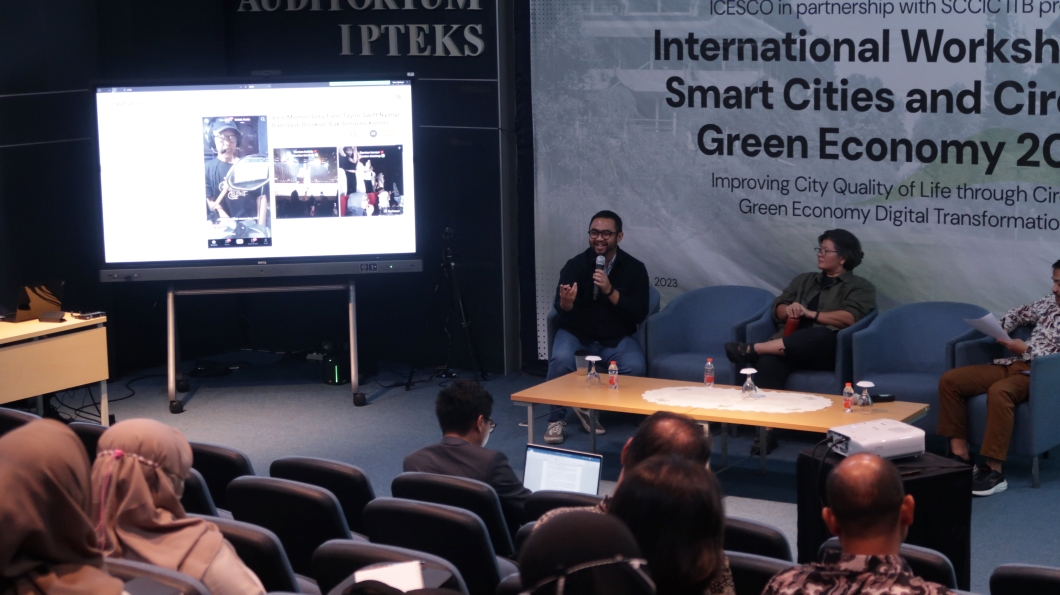
|
Getting your Trinity Audio player ready...
|
The Smart City and Community Innovation Centre at Institut Teknologi Bandung (SCCIC ITB), in collaboration with the Islamic World Educational, Scientific, and Cultural Organisation (ICESCO) – an organisation founded by 57 Muslim-majority countries in 1979 – has embarked on an event aimed at propelling the digital transformation and circular economy to new heights.

Prof Dr Mohammed Essaidi, representing ICESCO, underscored the digital facets of the transformation, highlighting the significance of green public space planning, smart health communities, mobility, digital innovation ecosystems, and circular economies as pivotal areas for further exploration.
He emphasised that smart cities are the linchpin for fostering circular and green economies, characterised by smart people, smart living, smart government, smart mobility, smart environment, and smart economy—all interconnected through digital technologies.
Further, the event delved into discussions about key performance indicators (KPIs) specifically tailored for smart cities, ranging from ISO 37120 standards for sustainable community development to IEEE P2784 standards, offering technological guidance and process frameworks for digital-centric smart city planning. In his concluding the presentation from, Dr Essaidi regarding a digital use case of a smart city in Casablanca, Morocco, as a smart city.
He underscored the significance of integrating cutting-edge technologies to enhance urban living while ensuring sustainable development. The use case presented shed light on several aspects that showcased the practical implementation of smart solutions in a real-world setting.
Dr Dwinita Larasati, a faculty member of the School of Arts and Design at ITB, continued the presentations by exploring the Piloting Circular (Creative) Economy theme with a strong emphasis on the digital transformation landscape. She illuminated Indonesia’s shift from an extraction-based economy involving activities like mining and deforestation to an economy characterised by intersectionality, heavily influenced by digital technologies. Dr Larasati accentuated the transition towards a digital intersecting economy that leverages human intelligence, ingenuity, and creativity in the digital realm.
As an ecosystem, the creative economy’s digital dimension goes beyond transactions of creative products, encompassing various elements such as digital practitioners, research and development, digital markets, and digital products. The network of cities and regencies in Indonesia that are committed to developing its creative economies association members concurred on implementing the ten principles of Indonesian creative cities, aligning them with the Sustainable Development Goals (SDGs) in a digitalised creative city that is compassionate, values diversity, and more. The implementation of these principles in each city’s unique digital context was discussed.
The Fashion Village Lab was a digital use case for Bandung’s creative circular economic initiative. Emerging from digital-focused research on the living conditions of textile workers, the initiative addressed challenges through innovative digital solutions.
Dr Larasati’s discourse extended to urban games, envisioning the city as a digital living laboratory. She stressed that, for them, a smart city transcends traditional perspectives, focusing on how digital technology can effectively solve urban problems, with urban games being one such digital solution.
Following this, Harry Anugrah Mawardi, the Executive Director of Creative Industries in West Java, delved into enhancing creative diplomacy through a digital lens. He highlighted that solution-oriented and creative digital solutions can offer innovative approaches to address global issues, emphasising the impact of digital creativity in diplomatic efforts.
Mawardi provided a digital example of creative diplomacy in West Java. In 2019, Governor Ridwan Kamil engaged in creative diplomacy by presenting his digital batik design to the CEO of a Swedish furniture company during a visit. This digital soft diplomacy aimed to foster cooperation for mutual benefit, successfully leading the Swedish furniture company to willingly allocate a special digital space for the local digital brand from West Java.
Overall, the discussions underscored a future trajectory for smart cities with a distinct focus on purposeful digital innovation, sustainability, and inclusivity. As digital technology shapes urban landscapes, the discourse anticipates digital advancements while critically examining their implications on societal well-being. Future smart cities are envisioned as technologically advanced and digital solutions genuinely serving the diverse and dynamic needs of urban populations.
















